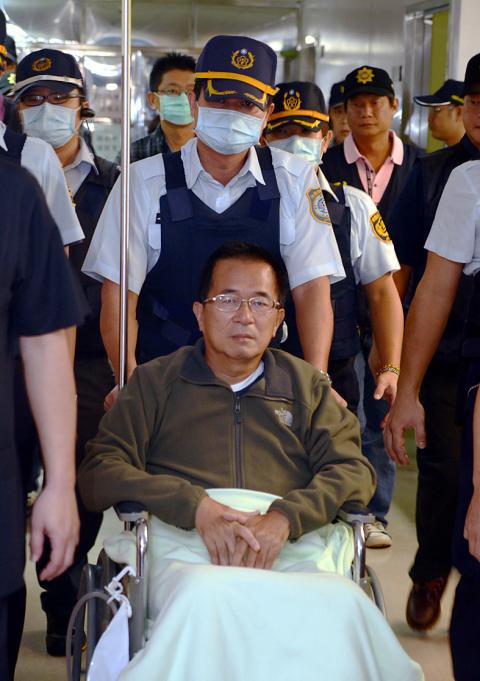Former president Chen Shui-bian (陳水扁) was yesterday transferred to Taipei Veterans General Hospital (TVGH) from Taoyuan General Hospital for further check-ups and treatments. The transfer to the TVGH was met with objections by Chen’s family, who said the hospital was “politically affiliated” with the Chinese Nationalist Party (KMT).
Chen Chih-chung (陳致中), his son, said the family would prefer that the former president be taken to Mackay Memorial Hospital in Taipei or to a hospital in southern Taiwan.
Chen Shui-bian, who arrived at the TVGH at 7:30am yesterday, refused to undergo a magnetic resonance imaging (MRI) test that the TVGH has arranged for him.

Photo: CNA
Chen Shui-bian later agreed to take the medical tests only after being comforted by TVGH physician Kuo Cheng-deng (郭正典) — who, at the request of the Chen family, has previously visited the former president at the Taoyuan General Hospital to examine his condition — in which Kuo said he would accompany the former president during the whole medical process.
Chen Tain-hsiung (陳天雄), TVGH’s vice superintendent, said the hospital has assigned a team comprising at least 10 urologists, neurologists and psychiatrists to examine the former president.
The examination would focus on his brain, cerebrovascular system and urinary tract using non-invasive methods such as MRI scans and ultrasounds, Chen Tain-hsiung said.
The former president, who is serving a 17-and-a-half-year sentence for corruption, was admitted to Taoyuan General Hospital on Sept. 12 after complaining of having difficulty urinating.
An MRI conducted at the Taoyuan hospital showed he had had a minor stroke.
Based on a recommendation by the Taoyuan General Hospital, the Ministry of Justice decided to transfer him to a different medical center for further examination.
Separately yesterday, human rights activists Hans Wahl and Harreld Dinkins, who arrived in Taipei to access the state of Chen Shui-bian’s human rights, held a press conference before leaving the country.
Dinkins said he was shocked by Chen’s slurred and unfocused speech and the unusual level of fatigue he showed during their 20–minute-long exchanges.
They also expressed concern over the selection of the TVGH because they had doubts over the facility’s independence given that it is a military hospital. In response to the Chen’s objections, Taipei Prison said in a statement yesterday that the TVGH has no political affiliation, adding that the hospital was selected mainly because it has advanced equipment and services, pointing out that former president Lee Teng-hui (李登輝) has also been treated at the hospital.

TRAGEDY STRIKES TAIPEI: The suspect died after falling off a building after he threw smoke grenades into Taipei Main Station and went on a killing spree in Zhongshan A 27-year-old suspect allegedly threw smoke grenades in Taipei Main Station and then proceeded to Zhongshan MRT Station in a random killing spree that resulted in the death of the suspect and two other civilians, and seven injured, including one in critical condition, as of press time last night. The suspect, identified as a man surnamed Chang Wen (張文), allegedly began the attack at Taipei Main Station, the Taipei Fire Department said, adding that it received a report at 5:24pm that smoke grenades had been thrown in the station. One man in his 50s was rushed to hospital after a cardiac arrest

A car bomb killed a senior Russian general in southern Moscow yesterday morning, the latest high-profile army figure to be blown up in a blast that came just hours after Russian and Ukrainian delegates held separate talks in Miami on a plan to end the war. Kyiv has not commented on the incident, but Russian investigators said they were probing whether the blast was “linked” to “Ukrainian special forces.” The attack was similar to other assassinations of generals and pro-war figures that have either been claimed, or are widely believed to have been orchestrated, by Ukraine. Russian Lieutenant General Fanil Sarvarov, 56, head

SAFETY FIRST: Double the number of police were deployed at the Taipei Marathon, while other cities released plans to bolster public event safety Authorities across Taiwan have stepped up security measures ahead of Christmas and New Year events, following a knife and smoke bomb attack in Taipei on Friday that left four people dead and 11 injured. In a bid to prevent potential copycat incidents, police deployments have been expanded for large gatherings, transport hubs, and other crowded public spaces, according to official statements from police and city authorities. Taipei Mayor Chiang Wan-an (蔣萬安) said the city has “comprehensively raised security readiness” in crowded areas, increased police deployments with armed officers, and intensified patrols during weekends and nighttime hours. For large-scale events, security checkpoints and explosives

PUBLIC SAFETY: The premier said that security would be tightened in transport hubs, while President Lai commended the public for their bravery The government is to deploy more police, including rapid response units, in crowded public areas to ensure a swift response to any threats, President William Lai (賴清德) said yesterday after a knife attack killed three people and injured 11 in Taipei the previous day. Lai made the remarks following a briefing by the National Police Agency on the progress of the investigation, saying that the attack underscored the importance of cooperation in public security between the central and local governments. The attack unfolded in the early evening on Friday around Taipei Main Station’s M7 exit and later near the Taipei MRT’s Zhongshan